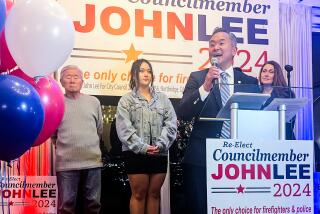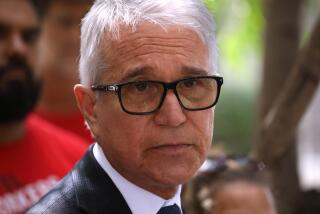L.A. mayoral election a wide-open contest
- Share via
For decades becoming mayor of one of the nation’s most ethnically diverse big cities revolved around a simple election strategy: dominate a couple of key voting blocs, then grab enough ballots from other slices of the metropolis to claim victory.
Tom Bradley forged a winning alliance of South Los Angeles blacks and liberal Westside Los Angeles whites over five terms. Antonio Villaraigosa harnessed the rising Latino voting bloc and the Westside to win his two terms.
But as the 2013 race to succeed the termed-out Villaraigosa gets underway, following that tried-and-true formula may be tricky. The winning candidate will have to find ways to get a big enough chunk of those disparate voting populations, but how is far less clear.
Of the four major candidates, three are City Hall veterans who largely share the same constituencies. City Councilman Eric Garcetti and City Controller Wendy Greuel will compete hard in the vote-rich San Fernando Valley — where Garcetti grew up and Greuel now lives — and in Hollywood — which Garcetti represents and where Greuel once worked. Councilwoman Jan Perry, the daughter of civil-rights advocates, will try to tap black voters while also taking credit for some of her downtown district’s glitzy development —she led the council drive to approve Anschutz Entertainment Group’s professional football stadium proposal.
Supervisor Zev Yaroslavsky’s decision not to run could make it easier for the candidates to attract Westside Jewish liberals, who usually cast roughly 11% of the vote. Also in play are pro-business votes that looked headed for investor Austin Beutner — until he dropped out abruptly — and mall developer Rick Caruso, who never actually jumped in.
Most significant, the lack of a major Latino candidate creates a scramble to capture their roughly 28% of the vote, said Raphael Sonenshein, a public policy analyst at Cal State L.A.
With the collapse of former Mayor Richard Riordan’s push to get a pension initiative on the May ballot, the race also lacks a defining theme leading into the March 5 primary and the expected May 21 runoff. In a sense, political observers say, it’s the up-for-grabs election.
“Nobody has a safe issue and nobody has a safe constituency,” Sonenshein said.
Villaraigosa will leave office June 30, so there will be no incumbent on the ballot for only the third time in 75 years. And the wild card in the race is Kevin James, a private attorney and former talk show host who has never held public office but is the only contender so far to attract backing from a Super PAC.
To win a spot on the May ballot, the top two candidates will need between 25% and 30% of the primary vote, experts say.
To achieve that, they must spell out how they will operate differently from Villaraigosa at a time when residents want more and better services even though City Hall coffers are chronically depleted, said Dan Schnur, a former Republican campaign strategist and USC political science professor.
“Wendy Greuel is holding herself out as the tough decision maker. Eric Garcetti is the optimist. Jan Perry is the roll-up-your-sleeves job creator and Kevin James is the outsider,” Schnur said. “None of them is running against Antonio Villaraigosa but each uses their persona to illustrate how they would be different.”
White voters, still the largest voting bloc and among the most reliable, make up about 45% of the electorate, said Fernando Guerra, a Loyola Marymount University political scientist who tracks city election data. Next year’s winner must appeal to a significant portion of whites, along with Latinos, to succeed, Guerra said.
Residents seem worried about many of the same things as in 2001, when former Mayor James Hahn marshaled a coalition of blacks and San Fernando Valley whites to defeat Villaraigosa only to be unseated by him four years later.
City Council members regularly field complaints from people or groups wanting them to do something about traffic and basic services, such as tree trimming and sidewalk repairs. Unlike in the 2001 and 2005 elections, however, the Great Recession has laid bare a city that is growing faster than the revenues that support it. That means today’s candidates have fewer spigots to tap to pay for those projects.
Each says they’ll appeal to key constituencies in the primary and then fine-tune their message for a broader audience in the general election.
Greuel claims an advantage because she’s the only candidate to have won a citywide contest. She’s landed endorsements from a number of prominent Latino politicians, as well as Democratic Sen. Barbara Boxer and entertainment titans Steven Spielberg, Jeffrey Katzenberg and David Geffen, who ran the DreamWorks motion picture studios when she was an executive there.
Her campaign believes that female voters will also be key, galvanized by the potential of electing the first female mayor in city history. Taken together, it’s a coalition that will get her to the general election, Greuel campaign strategist John Shallman says, and then give her the win, probably against Garcetti.
Garcetti’s camp isn’t conceding anything. Son of former Dist. Atty. Gil Garcetti, he is backed by the Latino Coalition of Los Angeles-PAC and recently won an important endorsement from the Democratic Party of the San Fernando Valley.
He identifies himself as half Latino, the grandson of Mexican immigrants, and often addresses Latino audiences in fluent Spanish. Although he now lives in Silver Lake, he’s a Valley boy, having grown up in Encino before leaving for college at Columbia.
And he pays attention to the city’s many smaller ethnic groups, such as Armenians and Filipinos, betting that their support, along with that of voters in his Hollywood district, will be crucial. He says he’ll use the same get-out-the-vote techniques that brought record numbers of voters to the polls in November.
Perry believes she’ll draw not only the 10% to 13% of votes cast by African Americans, but also fiscal conservatives who like her tough-on-unions talk and pivotal council role in shaping downtown redevelopment.
When people find out she’s Jewish, her share of that vote grows dramatically, Perry says, citing internal polling. She also thinks she’ll do well among working-class white women and Latinas, who see her as an aspirational figure.
Perry has sought to distinguish herself from her City Hall colleagues by talking bluntly about labor’s power in speeches and on the council floor. For instance, she recently suggested that a budget-boosting half-cent sales tax increase shouldn’t go on the March ballot because “then there would be no incentive for labor to freeze their raises.”
James, the only candidate to support Riordan’s proposal to switch new city workers from defined pensions into self-managed 401(k)-style retirement plans, said he would emphasize that stance and his status as the only major candidate not embedded in the City Hall establishment.
GOP ad man Fred Davis recently created a Super PAC to independently support James, and the candidate also believes he’ll draw backing from voters disaffected with City Hall.
However, political analysts say a big infusion of outside cash could end up hurting instead of helping the race’s only Republican candidate. Los Angeles is largely Democratic, liberal and suspicious of large sums spent to frame a campaign.
Still unclear is whether any candidate will gain the full support of organized labor, which has long been a force in city and regional politics, especially when it comes to fundraising and door-to-door campaigning. Villaraigosa, a former labor organizer, enjoyed backing from the Los Angeles County Federation of Labor, even when he was calling for employee layoffs. The group is led by one of his closest confidants, Maria Elena Durazo. This week the organization announced that it would make no mayoral endorsement until after the primary.
Unions’ financial support, along with the foot soldiers they provide, could be key, especially in the general election, Sonenshein said.
“It could come down to who is seen as more labor-friendly in a labor-dominated town,” he said. “Labor is more powerful than business these days.”
catherine.saillant@latimes.com
More to Read
Sign up for Essential California
The most important California stories and recommendations in your inbox every morning.
You may occasionally receive promotional content from the Los Angeles Times.














